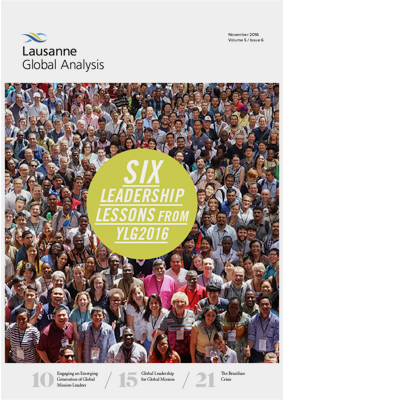Welcome to the November issue of Lausanne Global Analysis. We look forward to your feedback on it.
This issue of LGA has as its theme Leadership, inspired by the fact that the Lausanne Younger Leaders Gathering (YLG2016) took place in Jakarta in August. This issue starts with a reflection by two key YLG organisers on the six leadership development lessons that they learned through it. We then analyse how we can engage the emerging generation of global mission leaders in embracing the challenge of partnerships. After that, we broaden the focus further to consider how mission leaders can become great global leaders. Finally we suggest how Christian leaders and those for whom they are responsible should respond when faced with a polarised and divisive political situation such as the ongoing crisis in Brazil.
‘It usually takes decades to see the fruit from this kind of gathering. However, God has already allowed us to see overwhelming fruit in the form of kingdom connections’, write Sarah Breuel (IFES staff and church planter, Rome, Italy; Director for YLG2016) and David Benson (Lecturer at Malyon College, Queensland, Australia; Programme Director for YLG2016) about YLG2016. Six leadership development lessons that came out of YLG were: to honor God with your whole heart; choose the right people; and listen for the still, small voice; that leadership development is a communal process; one generation needs the other; and the best connection for global mission comes through sharing stories. ‘Through YLG2016 we have journeyed together—together with God, together with one another, together as a global church, and together as generations. We put our full trust in God and served him with all our hearts; and we now can testify to his faithfulness, for he indeed has done immeasurably more than we all had asked or imagined, they conclude.
‘Our common mission arises out of our common identity in Christ. This must inform all reflection on a biblical paradigm for effective mentoring of emerging leaders and partnering for mission’, writes Nana Yaw Offei Awuku (Field Director for Scripture Union, Ghana; Director of Lausanne Younger Leaders Generation initiative). The massive movement towards Christian faith in the global South creates the need for new models of geographical partnerships, structural partnerships, and generational partnerships for mission, as well as authentic cross-cultural friendships. However, the church needs to re-emphasize and re-engage the priority of the ultimate partnership with God in the missio Dei. This should be the foundation for all partnerships for global mission. ‘As we celebrate the dynamic growth of the church globally, it is time to engage the new generation of global mission leaders in embracing the challenge and beauty of kingdom partnerships for the gospel’, he concludes.
‘The mission workforce that will complete world evangelization in this generation will be a mosaic of global leaders, with diverse—even clashing—backgrounds, skills, and experience’, writes Mary Ho (Executive Director of All Nations Family). In this increasingly complex world, every mission leader is going to have to be a global leader who masters key global leadership competencies. Global mission leaders must know when to exercise which cross-boundary skill at different times. Having times of cultural self-reflection is helpful for gauging each situation. Amazing innovations are produced by combining ideas from centralized and local sources or by integrating diverse contributions to create a new norm. Mission leaders are called to be world-class global leaders. ‘We must cultivate global leadership competencies in the greatest global endeavor—to complete the remaining task of world evangelization in this generation’, she concludes.
Some Brazilian Christians have adopted polarized positions during the current political crisis, a phenomenon not confined to Brazil. We offer some principles to guide Christian leaders and others in how to respond. ‘Knowing how to behave is more important than knowing what position to adopt’, write Paul Freston (CIGI Chair in Religion and Politics in Global Context at the Balsillie School of International Affairs and Wilfrid Laurier University, Canada) and Raphael Freston (masters student in sociology at the Universidade de São Paulo). It is also important to cultivate Christian political reticence, distinguish different debates, recognize the many possible positions, go beyond simplistic moralism on corruption, and distinguish between an ideal and its carrier. History springs many surprises. The person who subordinates their reading of the faith to a passing social consensus will discover that their reading has become strangely dated. ‘That is why we must affirm the importance of Christian political pluralism, in which some will be more to the right, others more to the left, never despising or excommunicating those with whom we disagree politically’, they conclude.
Whether you are planning to read the full articles or just the executive summaries, we hope that you find this issue stimulating and useful. Our aim is to deliver strategic and credible analysis, information, and insight so that as an influencer you will be better equipped for the task of global mission. It’s our desire that the analysis of current and future trends and developments will help you and your team make better decisions about the stewardship of all that God has entrusted to your care.
Please send any questions and comments about this issue to analysis@lausanne.org. The next issue of Lausanne Global Analysis will be released in January.

